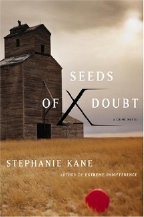Seeds of Doubt
Stephanie Kane
Scribner/McMillian Library/Simon & Schuster
US Hardcover First
ISBN: 0-7432-4557-1
288 Pages; $24.00
Publication Date: November, 2004
Date Reviewed: October 18, 2004
Reviewed by: Terry D'Auray © 2004

REFERENCES
COLUMNS
|
|
|
Seeds of DoubtStephanie KaneScribner/McMillian Library/Simon & SchusterUS Hardcover FirstISBN: 0-7432-4557-1288 Pages; $24.00Publication Date: November, 2004Date Reviewed: October 18, 2004Reviewed by: Terry D'Auray © 2004 |
|
|
REFERENCES |
COLUMNS |
In 'Seeds of Doubt', the third series novel featuring dyslexic attorney Jackie Flowers, Stephanie Kane not only continues to develop and expand the arc of her primary character, she moves the series out of the courtroom and onto Jackie's personal turf, taking it from a solid legal drama to a story of meaty psychological suspense.
When the body of the five-year-old son of wealthy Denver banker Christopher Boyd is found in a local park, the primary suspect is Boyd's sister Rachael, recently released after serving a 30-year prison term for a suspiciously similar killing, that of her youthful playmate Freddie Gant. Convinced to defend Rachael by her ex-boyfriend Dennis, Jackie takes on an enigmatic client and a case with one foot in the past and the other in the present.
As readers now expect with Kane's series, characterization dominates, and Flowers is at the center of the narrative, her hallmark dyslexia ever-present, but outwardly unacknowledged. Here, the physical and behavioral manifestations of her dyslexia are less in focus, while the psychological consequences of the affliction and its role in shaping her present character are more thoroughly explored. Flowers is evolving as a series protagonist, becoming both more sure-footed and more nuanced as Kane adds new layers with each book. Returning, too, are Jackie's two side-kicks - Pilar, her professional assistant and investigator, and Lily, her precocious pre-teen neighbor. Pilar in particular gets more air-time in 'Seeds of Doubt', where Kane reveals details of her past that expand our understanding of this recurring character.
It is the enigmatic Rachael, however, who drives much of the narrative's action, and whose disquieting past and equally unsettling present provide much of the tension. Staying in Jackie's house as a condition of her bail, Rachael alternates between being obtrusive and withdrawn, her behavior sometimes believably normal and other times ominously aberrant. Rachael's persona evolves slowly; her guarded relationship with her brother is exposed bit by bit; her childhood terrors revealed from pieces of historical record. In one particularly gripping segment, Flowers is trapped in the attic of her own house, in complete darkness, surrounded by the sound of a buzzing bee. It is a nail-biting scene on its face, with Jackie forced to confront her near paralyzing fear, but it is made better still by the possibility that Rachael may have been responsible for setting the trap. A strong undercurrent of suspicion and distrust pervades this novel; tension runs high.
'Seeds of Doubt' is a novel built of contrasts: the new murder and the old one; the modern urban setting of the current-day crime versus the small-town rural one of the historical murder; Jackie, the self-professed misfit versus Rachael, the "bad seed" perhaps unjustly convicted of murder. The narrative seamlessly blends these contrasting elements into a fully-shaped whole, alternating between contemporary exposition and journeys through history. Old police reports and a tell-all feature story from the Freddie Gant murder some 30-years prior comprise full chapters of book. Unless skillfully written, these faux-historical chapters can be pace-killing narrative asides. Kane avoids this very simply by having the writer of the 30-year-old feature article reappear as a writer in the current-day story, and he becomes yet another shadowy, suspicious participant in the drama. Kane masterfully yo-yos the tension between the past and the present, between pervasive suspicion and speculative reality. The denouement is taut, terrifying and a true surprise.
One of the hallmarks of a satisfying long-running series is that the recurring characters evolve and change from book to book. We want series characters to be as familiar as old friends, but never predictable and never boring; we want each book to build layers of character and continuity without loosing the anchor that provides their perpetual appeal. And we want each book to be fresh, distinctive, and, of course, better than the last. Stephanie Kane's given notice that her Jackie Flowers series can do exactly that.